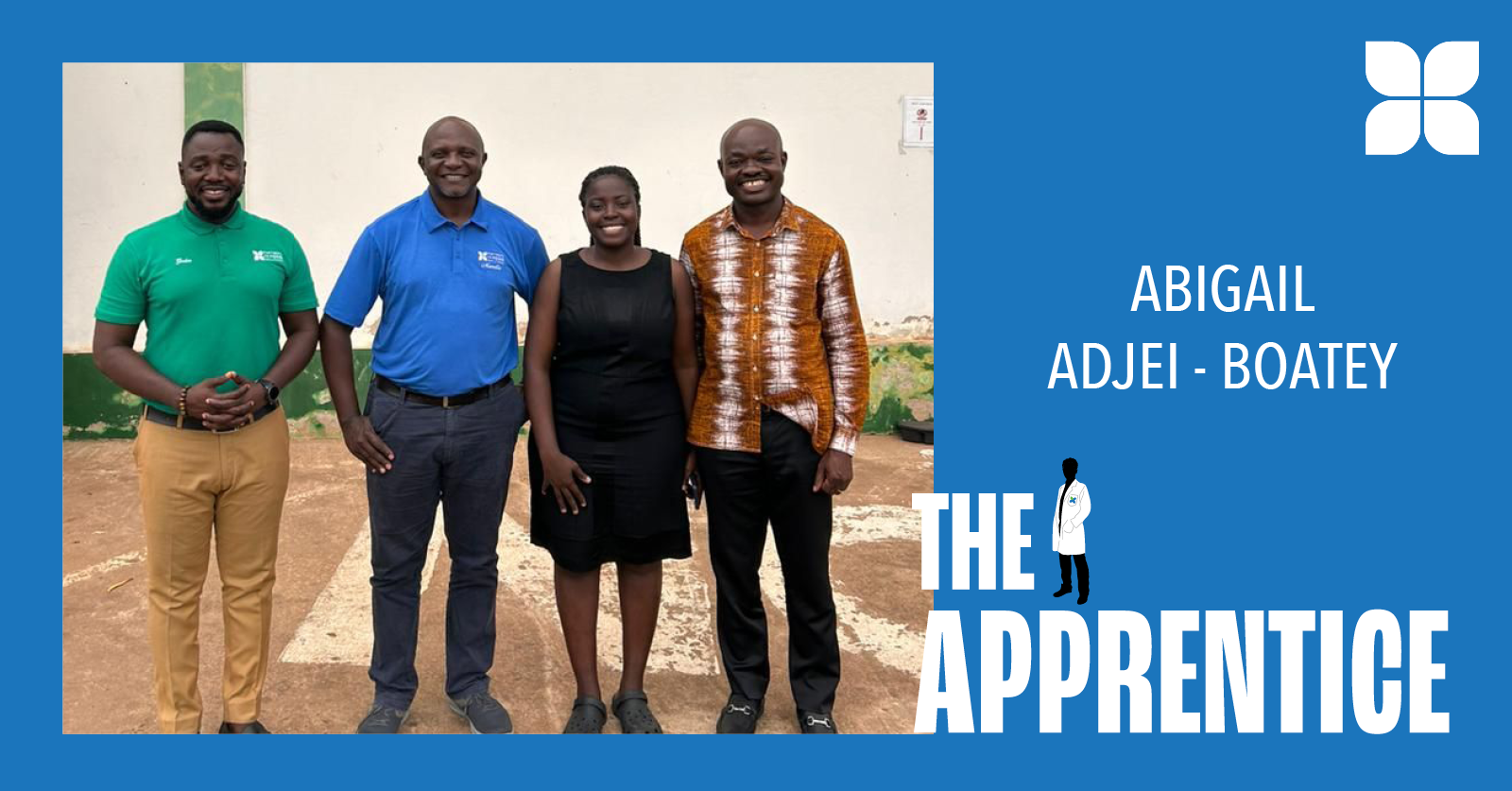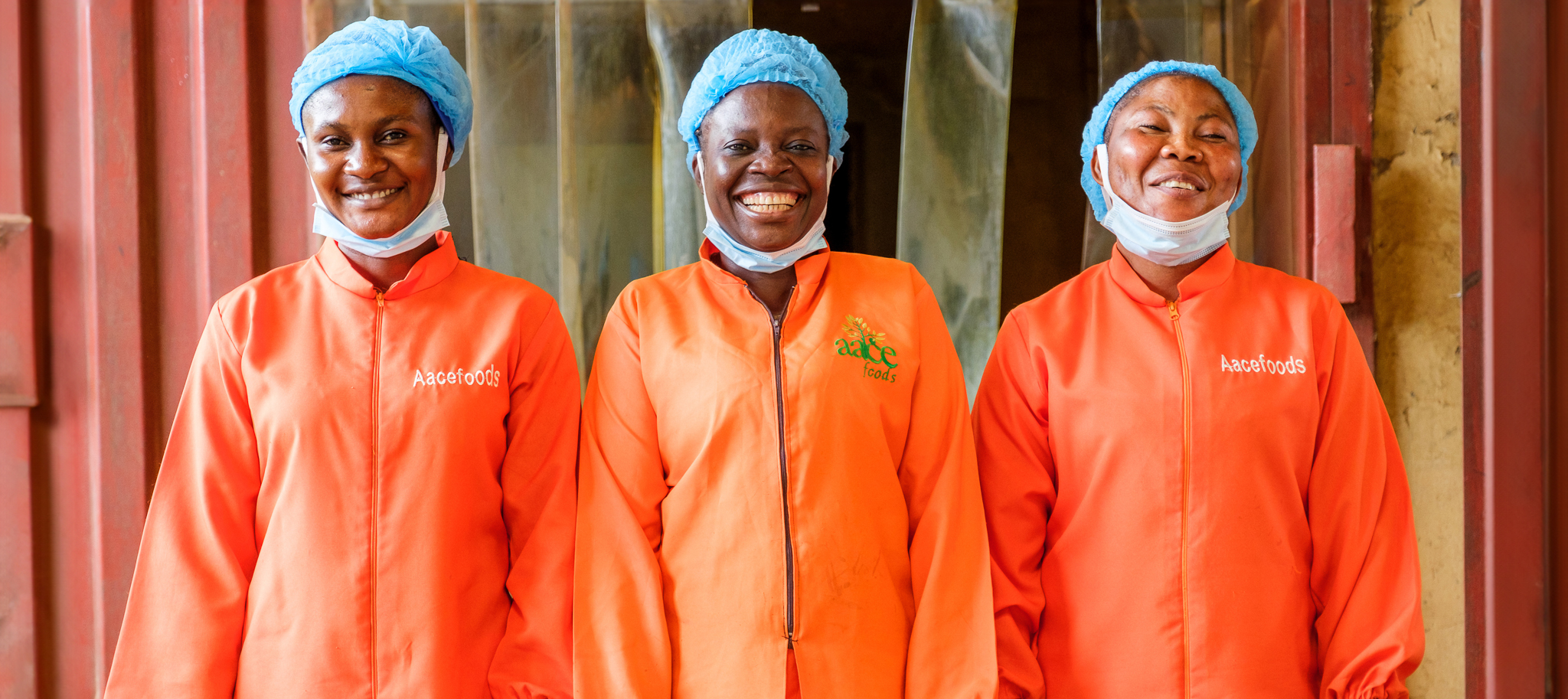The Apprentice: Abigail Adjei-Boatey
Abigail Adjei-Boatey served as a quality assurance officer during her apprenticeship at Eden Tree Limited, a fruit and vegetable processor in Ghana, ensuring the company’s produce met the highest quality and safety standards.
For her, this role was a deep dive into practical problem-solving, data analysis and communication and equipped her with a strong understanding of food safety regulations. One highlight during her tenure was developing and implementing a pasteurization protocol for Eden Tree’s new fruit juice line, which improved product safety and shelf life.
Abigail believes she is now equipped to address critical challenges in food safety and quality through innovation and continuous improvement. Through PFS, she was also mentored by Ardent Mills’ Justin Bakke, and got to build invaluable professional networks which will offer her support and guidance that will last throughout her career. The hands-on experience, combined with seeing Eden Tree’s products thrive in the market were some of the best parts of her apprenticeship.
Abigail is pictured here with PFS' Ghana Program Manager, Gordon Okyere (far left), CEO Mandla Nkomo (middle), and West Africa Program Manager, Christian Dedzo (right).
Argidius Foundation Helps PFS Boost Growth of African Food Processors
PFS is buoyed by the support of not only its corporate partners, but also with the backing of generous individual and organizational donors. We were pleased to join one such partner - the Argidius Foundation - on a visit to our client Pristine Foods, producers of extended shelf-life egg products in Uganda. Argidius has supported PFS' work in Uganda and Kenya, and this visit was an opportunity to showcase how their sponsorship has empowered PFS to support high potential companies that produce nutritious food to nourish communities.
Argidius Foundation aims to tackle poverty through enterprise development in Africa and South America. Their goal is to help entrepreneurs to build profitable businesses and contribute to the sustainable development of their communities. PFS entered a three-year partnership with the Foundation in 2020, with the aim of supporting 150 high potential clients in Africa to increase their growth and resilience and to empower them to overcome ecosystem challenges while protecting and improving their bottom-line. We are grateful to the Foundation for their support and the many learnings gained through our partnership with them.

Nutritional Innovation Through Biofortified Bakery Products
Sanavita Company Ltd is a Tanzanian food processor that aims to address the country’s high rate of malnutrition and micronutrient deficiencies by increasing awareness and promoting the consumption of biofortified foods. They are currently known for their fresh orange fleshed sweet potato (OFSP) and its flour. OFSP is a special type of biofortified sweet potato that contains high levels of beta-carotene, that is converted to Vitamin A in the body. It is important for vision, growth, cell division, reproduction, and immunity. Sanavita ventured into a bakery line to diversify their product portfolio and provide more nutritious offerings to their community and beyond. They contacted PFS and Technoserve for help to improve their bread and biscuit formula and were paired with volunteers from General Mills and Cargill.
Cargill’s Aaron Reed was the perfect fit for this project. He is a senior food scientist who works in the bakery applications team within the food and bioindustrial ingredients business. He has 21 years of food industry experience, most of which has been in research and development for bakery products. “I have had the pleasure of working with many smart and talented people over my career and have learned so much from them. I want to be able to pass that knowledge along to others to help them make the best products possible,” said Aaron. “I also enjoy learning about new products and cultures and have enjoyed the teaching aspect that comes when sharing knowledge with others.”
Aaron was not familiar with recipes for sweet potato buns or cookies and he did not have certain ingredients (like bean powders) on hand, so it took some time for him to understand the critical attributes of the products. Despite this, he worked with the Sanavita team who shared photos and provided detailed descriptions, allowing him to understand the type of product they wanted to make, propose some formulas, and do some benchwork to test the proposed formulas. Further discussions helped the volunteer team understand what the client liked and disliked about the recipes and fine tune the product.
By the end of the project, Sanavita had a much improved product which has received very positive feedback from customers. “The procedure shared by the volunteers was very useful and I learned how to follow a step-by-step approach to product formulation,” said Sanavita Ltd.’s Managing Director Jolenta Joseph. The whole team appreciated the opportunity to work together, and it was a good experience for all who were involved. “This was one of my favorite projects to have been able to work on so far with PFS. I am impressed with those who are willing to go out on a limb to start a business or who are trying to grow their existing business. It is not easy, so if I can help in some small part of that, it is satisfying to me to be able to help them improve the products they are offering.”

Volunteer Brews Success for Client with Reformulation of Maize Drink
Malawi is a landlocked country in Southern Africa, ranked as one of the poorest in the world, with about 70% of the population currently living below the $2.15 per day international poverty line. The situation has been exacerbated in the last two years, following currency devaluations by the country’s central bank which has seen the Malawian Kwacha lose nearly half its value against the US dollar. The resulting price hikes in commodities, fuel and utilities, has led to increased production costs for manufacturers across all sectors.
PFS client Chibuku Products Ltd. (CPL) is one of these producers, who has not been spared. CPL produces ‘maheu’ a traditional Southern-African drink made from maize flour, milk, sugar, and flavors. It is usually consumed as a whole meal because it leaves consumers very full. As the Kwacha weakened and inflation soared, CPL saw its production costs skyrocket. The beloved maheu faced threats to its production viability due to soaring costs of imported ingredients. “At the rate things were going, it was going to become unprofitable to produce the maheu drink,” said James Chimtengo, quality manager for Chibuku Products Ltd.
They reached out to PFS for help and the challenge was clear: help them reduce production costs without compromising the integrity, taste, or nutritional value of maheu. With the expertise of dsm-firmenich’s Zhen Wang, a senior fermentation operations scientist, based in Maryland, USA, the journey toward a more sustainable maheu began. Zhen joined this project (her first with PFS) following a recommendation from her colleague who knew she would be a great fit. “We began the project with a very simple information sheet, so our first few meetings were to understand the situation and the need. I have never been to Africa, so all my understanding and knowledge was based on Google or research.”
Through countless meetings and a meticulous examination of the production process, Zhen worked with CPL towards innovation. Using lean methodology, she analyzed their production process and made proposals for them to review. They then discussed the feasibility of each suggestion and followed up on the actionable items. Mr. Chimtengo said, “As difficult as we were, giving reasons why several suggestions could not work, Zhen continued availing herself for our online meetings. She listened to us, took notes, re-examined the production process, and made new recommendations. This required commitment, and she was blessed with lots of it.”
The breakthrough came with bold decisions. Milk was replaced with high-quality, creamy powdered milk. The result? A reformulated maheu recipe that not only met the stringent quality standards but also reduced production costs by half. With every sip of maheu, affordability and sustainability now intertwine seamlessly. Chibuku is already making significant profits from the sale of the reformulated drink on the market. Reflecting on the collaboration, Zhen Wang shared, “I really enjoyed working with Chibuku. They were responsive and challenging. I was happy to help and learned a lot from them in the process too.”
PFS Releases FY2024 Annual Report
Check out our newest annual report, covering our fiscal year 2024. Highlights include a look at PFS' recently completed three-year strategy successes and the volunteers who made our six year partnership with TechnoServe so impactful.

